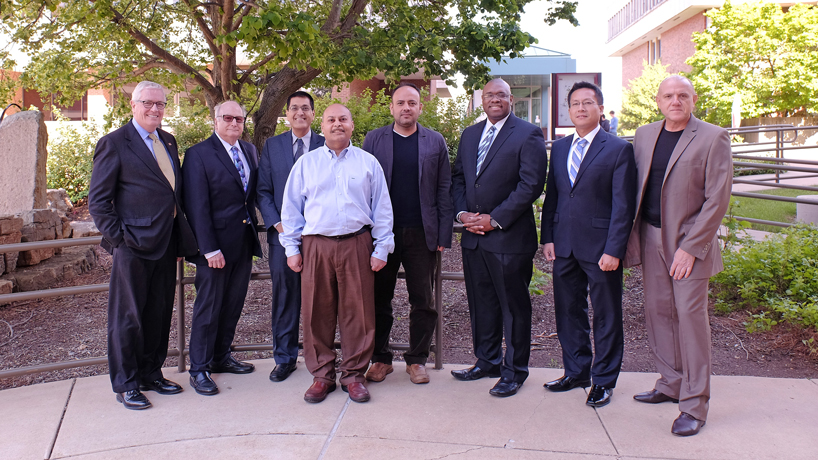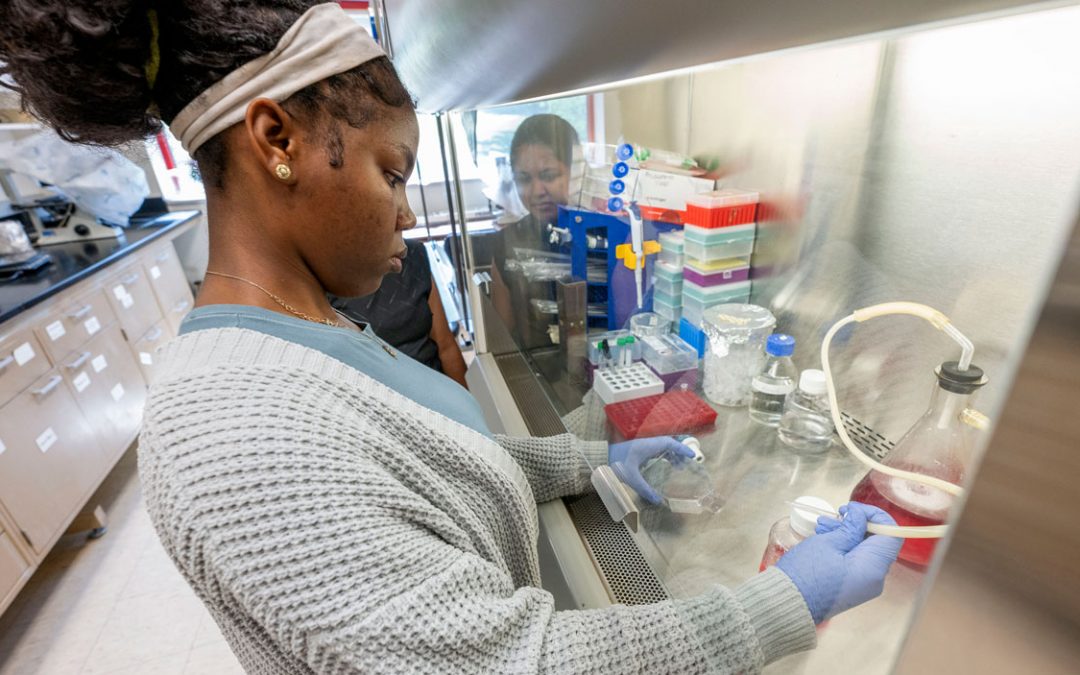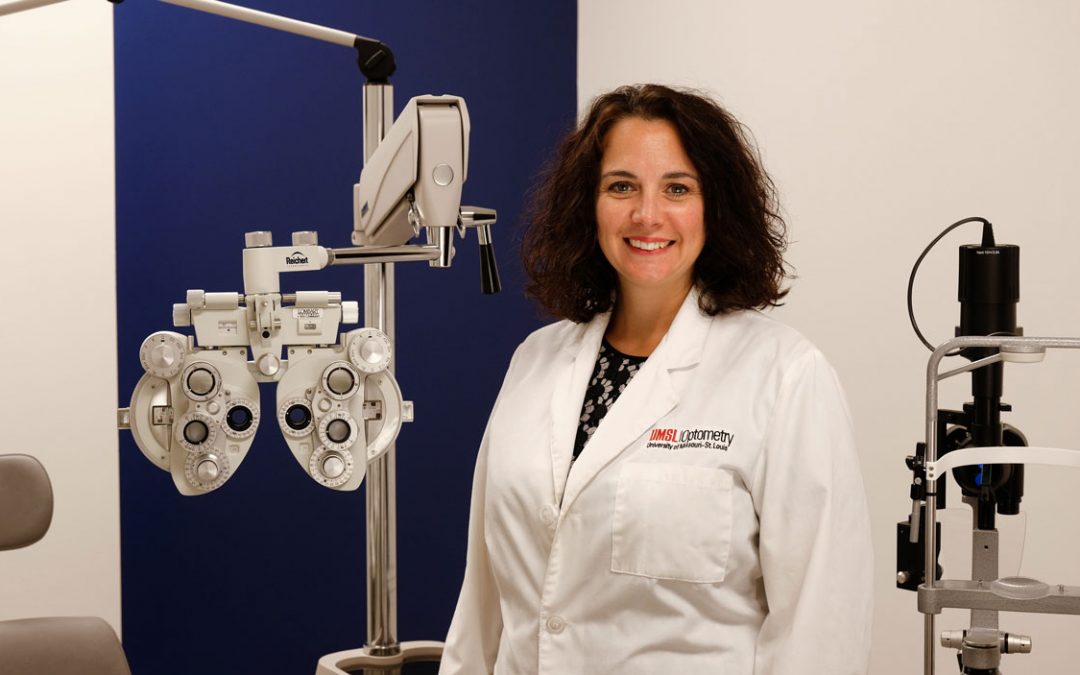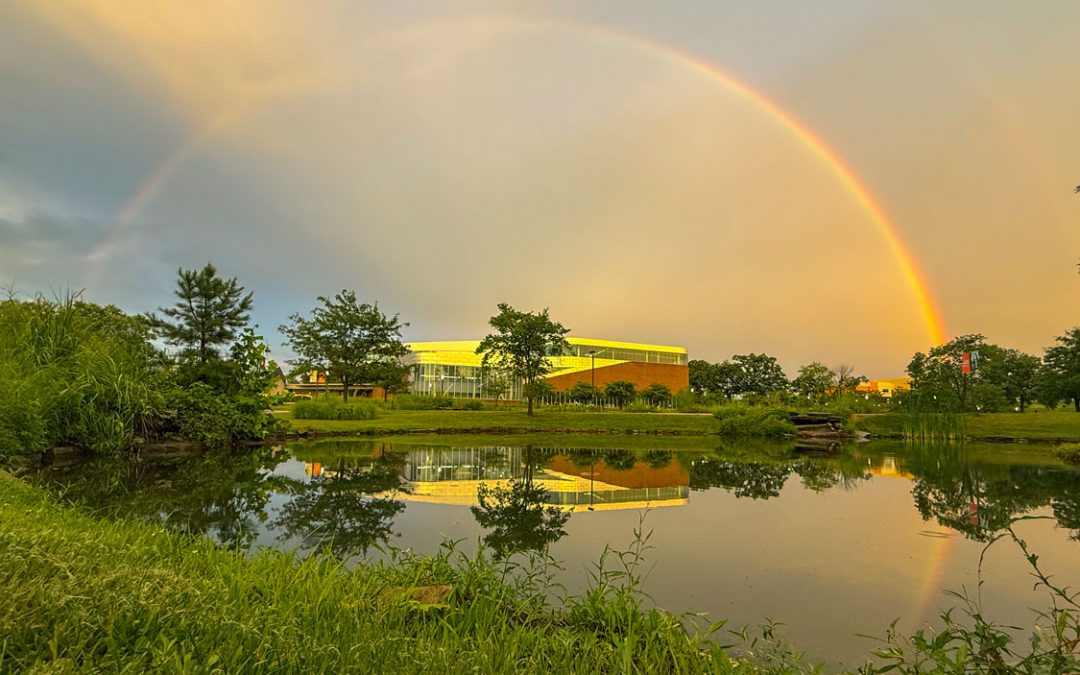
Those invested in the development of UMSL’s world-class cybersecurity program include (from left) Charles Hoffman, dean of the College of Business Administration; Ronald Yasbin, dean of the College of Arts and Sciences; Dinesh Mirchandani, chair of the Department of Information Systems; Sanjiv Bhatia, professor of computer science; Shaji Khan, assistant professor of information systems; Maurice Dawson, assistant professor of information systems; Jianli Pan, assistant professor in the Department of Mathematics and Computer Science; and Cezary Janikow, associate professor of computer science. (Photo by August Jennewein)
By Marisol Ramirez and Bob Samples
The National Security Agency and the Department of Homeland Security have designated the University of Missouri–St. Louis a Center of Academic Excellence in Cyber Defense Education, Chancellor Tom George announced today.
UMSL is currently the only institution in the St. Louis region and only one of two institutions in Missouri to hold this rare and prestigious distinction. UMSL’s Cybersecurity Program offers undergraduate and graduate certificates as well as an undergraduate minor to students.
“The NSA/DHS accreditation is the gold standard for the quality of a cybersecurity program and qualifies our students for cybersecurity positions at intelligence agencies and the military,” George said. “We are now amongst an elite group of institutions to have access to federal cybersecurity scholarships for students and grants for infrastructure development and the authorization to use the official NSA and DHS seals on our website and in our program brochures.”
The honor comes just two years after the formation of the UMSL Cybersecurity Program, a joint effort of the Department of Mathematics and Computer Science (CS) from the College of Arts and Sciences and the Department of Information Systems (IS) from the College of Business Administration.
The implementation team includes Cezary Janikow, Jianli Pan and Sanjiv Bhatia of CS and Dinesh Mirchandani, Shaji Khan and Maurice Dawson of IS.
“This team has developed, in less than 2 years, a world-class cybersecurity program with innovative lab exercises in ethical hacking and cyber defense,” Professor Mirchandani, chair of the IS Department, said. “This is exciting news for UMSL’s students who can now further distinguish themselves from their peers in the job market.”
Among those distinctions is approaching cybersecurity education from a multi-disciplinary viewpoint.
“A major challenge in cybersecurity has been to bridge the gap between business stakeholders and technical specialists. Addressing security issues requires both management and technical perspectives working in tandem. We created our programs embracing this idea from the start,” Khan said.
“Students learn from different technical perspectives,” Assistant Professor of IS Dawson said of the information systems and computer science collaboration. “CS students get exposed to a systems viewpoint as well as software tools and methodologies, whereas IS students are exposed to algorithms and mathematical theories underlying cryptography and data networks”
Assistant Professor of CS Pan concurred, saying that UMSL’s Cybersecurity Program is “special because it is a joint effort between the CS and IS departments. Through close coordination we offer two parallel tracks for students with different backgrounds, which provides more choices for the students to pursue different specialties and achieve their academic goals.”
“The students also can explore more in-depth technical aspects of cybersecurity or study the business or management sides of cybersecurity,” Pan said. “The program really offers students the best chance regionally to be successful cybersecurity professionals.”
Also critical to achieving the CAE-CDE designation was the recently established Cybersecurity and IT Innovation Lab (CITIL).
“CITIL encompasses a physical lab as well as sandboxed virtual labs that provide students the opportunity to learn by doing. They can engage with security concepts hands-on and do so in a safe environment,” Khan said.
The CAE-CDE designation is valid for five academic years, after which UMSL must successfully reapply in order to retain it.
NSA and DHS jointly sponsor the CAE-CDE program, which aims to reduce vulnerability in the national information infrastructure by promoting higher education and research in cyber defense and producing professionals with cyber defense expertise for the nation.
NSA/DHS certificates will be presented to institutions during an evening reception at the National Cyber Security Summit in Huntsville, Ala., on June 8.
For more information about cybersecurity at UMSL, visit cybersecurity.umsl.edu.
Media Coverage:
St. Louis Post-Dispatch















